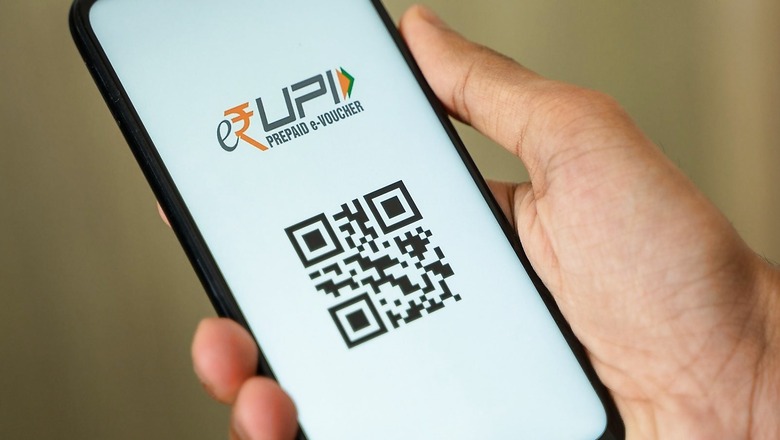
views
A cash on delivery payment, purchase at a hypermarket, mom-and-pop stores and vegetable cart, mobile recharge, bill payment, filling at a fuel station and an offering at a temple – what cuts across all these activities is a UPI payment — scan and pay. The Unified Payments Interface (UPI) — India’s technological sophistication in digital payments — is simple, safe, secure and speedy to make instant payments round the clock.
These features along with zero cost and mobile first translated into overwhelming adoption across the country as seen in these numbers – 1,368% in volume and 1,941% in value in 2021-22 over 2017-18 with transaction value crossing $1 trillion in FY22, one-third of nation’s GDP.
According to the ACI Worldwide report ‘Prime Time For Real Time 2022’, India accounted for the largest number of real-time transactions in 2021 (48.6 billion). This figure was almost threefold that of the closest challenger, China, (18 billion transactions in 2021) and almost seven times greater than the combined real-time payments volume of the world’s leading economies — the US, Canada, the UK, France and Germany (7.5 billion). This has been possible due to the Modi government’s approach.
The technological design that underlies the UPI can absorb and accommodate more payment methods as the need arises, and the latest into its fold is linking of RuPay credit cards. With the likelihood of all banks adopting RuPay credit cards in a few months and doing away with debit card requirement for registering with the UPI, the dependence on foreign card network operators will come down to zero.
In the international circuit, NPCI International Payments Limited (NIPL), the international arm of NPCI, is engaging with more than 30 countries for the acceptance of RuPay credit cards in an effort to internationalise RuPay and a concomitant zero dependence on foreign card network operators.
This development of zero dependence on foreign card network operators is India’s response to US sanctions on Russia in 2014 and to the subsequent, US card network operators denying service to Russian banks. The recent US sanctions on Russia with the US card network operators pulling out from Russia in the light of the Ukraine crisis also corroborates Delhi’s response. The 24/7 availability of systems and networks, be it physical or digital, which have a large-scale impact on the economy and public policy, is non-negotiable.
One of the areas of payments, which is still exposed to the western hegemony is India’s cross-border payments driven by SWIFT (Society for Worldwide Interbank Financial Telecommunications) whose control and command, though unannounced, rests with the US. The recent financial sanctions on Russia by the US also included unplugging the country’s banks from SWIFT to facilitate cross-border payments, the harsher version of 2014 when Russia just faced the threat of expulsion from SWIFT.
Banking on the stupendous success of UPI, drawing inspiration from its efforts that will lead to decoupling from foreign card network operators and wary of the expulsion of Russia from SWIFT, the NIPL is actively engaging with more than 30 countries for the UPI integration with their fast payment systems to facilitate cross-border payments including remittances. The NIPL has already signed MoUs with France, UAE and Singapore. The linkage of Singapore’s fast payment system PayNow is expected to be operational in the H2 of 2022.
With an average cost of $13 to send $200, more than 30 million Indians living overseas have remitted $87 billion in 2021, the biggest inflow for any country and this compares with roughly $85 billion FDI India received in FY22. According to the RBI’s Annual Report 2021-22, the UPI-PayNow linkage aligns with the G20’s financial inclusion priority of enabling faster, cheaper and more transparent cross-border payments. It can also contribute towards fulfilling the United Nation’s Sustainable Development Goals (SDG 10.c) by reducing cost of remittances.
The fast payment systems linkage with various countries will expand economic ties and also quickly multiply trade, travel, tourism and investment flows between India and other countries. Not only integration with fast payment systems of other countries, India is also proceeding to internationalise the UPI and is formally coded in RBI Payments Visions 2025 – “The potential of UPI has been recognised world over by numerous authorities. Reserve Bank shall actively support the global outreach initiatives to expand the footprint of domestic payment systems by collaborating with relevant stakeholders e.g., Central Banks, BIS, World Bank, other institutions, etc”.
India’s aggressive push for internationalisation of UPI and stitching partnerships can also serve as the template for other countries to implement faster payment systems and expand partnership with other countries. This will result in decentralised global web of linkages of faster payment systems devoid of central command unlike SWIFT, a global centralised system whose de facto supreme commander is the US and the history tell us that SWIFT was not immune to threat of sanction from its commander.
India, which has set increasingly bigger economic goalposts at different times in future, is steadily installing bulwark to shield itself from unforeseen and unexpected bullying and pressure tactics by the economic leverage induced western hegemony. If 1991 was the moment of liberalisation, 2022 will be the moment of internationalisation of rupee and UPI is certainly leading it.
UPI is accelerating the financial inclusion and fostering the less-cash and less-card society, and this will undoubtedly be robust and the best real-time digital payments system in the world and will act as Delhi’s digital bridge to driving rupee across global payment corridors.
Sandeep Vempati is joint convener, BJP Telangana. He holds a Master’s degree in finance from University of London. The views expressed in this article are those of the author and do not represent the stand of this publication.
Read the Latest News and Breaking News here

















Comments
0 comment